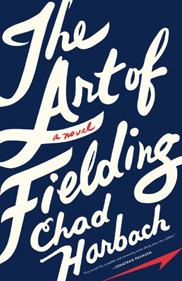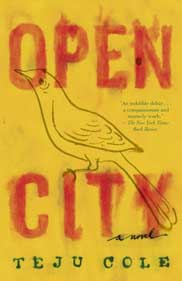by Nathacha Appanah
Buy at Powell’s »-
March 29, 2012
Zombie Round
-
Chad Harbach
2The Art of Fielding
v.
3Open CityTeju Cole
-
Judged by
Walter Kirn
Due to a recent, unforeseen medical incident, Walter was unable to write up a judgment by press time, though he was able to complete both books and pass along his decision.
Kevin: If this were a radio program or a podcast this would be the part where there’s an awkward silence as we improv and stumble our way through the start of it and listeners wonder what the H is going on.
Um, due to a personal medical situation that we hope is not serious, Walter Kirn has been unable to send us the explanation for his judgment. We apologize for that and we hope he’s feeling better soon. He was, however, able to tell us his decision, which we will reveal in a moment.
I had been familiar with Kirn mostly through his essays and criticism, but when Up In the Air came out, a decade or so ago, you just wouldn’t stop raving about it, John, and so I read it on a plane ride to Boston and back and just loved it as well, and have been a fan of his fiction ever since.
More than just admiration for his work, I think one of the reasons I was so excited about Kirn being on Team Rooster this year is that he is one of the rare examples of a writer who is able to move gracefully back and forth between being a critic and a novelist. When I say “critic,” I don’t just mean someone who occasionally reviews books, or does wise-ass commentary for a make-believe internet book award, but rather a person with a meaningful body of critical work, which Kirn has. I just think most writerly heads aren’t shaped in such a way that they can wear both those hats and look good doing it. But Kirn certainly does. So I was looking forward to complimenting him on his perfectly shaped author noggin.
As someone who is even more familiar with his work than I am, John, do you have any thoughts on what Walter Kirn might say about this matchup?
John: I too am really disappointed that Walter Kirn couldn’t be here with us today since he is absolutely one of my favorite working novelists and I was looking forward to him learning that I exist. You mentioned Up in the Air, which I assume people are familiar with thanks to the Clooney film version, which, in Kirn’s words shares the same “genetic code,” as the book, though the two are very different in important ways.
Up in the Air is fantastic, but I rank it behind Mission to America, Kirn’s novel of Mormon-like missionaries from the much smaller Aboriginal Fulfilled Apostles, who must venture forth not to save souls, but to gather converts with some dough to keep the Apostles afloat.
I’m sure my enjoyment of Kirn is very, very closely tied to the fact that he writes the kinds of novels I aspire to write myself, novels about the America we live in that are maybe just a few years ahead of their time, novels of ideas that are also tied to characters and situations you can get invested in.
Kirn also often combines funny and sad—or more accurately, melancholy, which is a state of being I associate with our native Midwest, a feeling beyond sadness, more like a weltschmerz, an understanding that the sadness is rooted in something elemental that’s probably beyond our control. At the same time, his characters strive to be or do some measure of good, even as they recognize that doesn’t mean a whole lot in the grand scheme of things. The book version of Up in the Air is much sadder and wearier, while also being sharper and funnier. To my sensibilities, anyway, it’s also more satisfying, and that’s coming from a guy who liked the movie quite a bit.
Thinking of Kirn’s own work, I could see him finding favor in both of these novels.
For The Art of Fielding, I imagine that the setting and atmosphere could spark some interest. Kirn wrote a memoir of his own college years (also awesome), Lost in the Meritocracy, which examines his attempt to assimilate at Princeton, coming from the Minnesota Iron Range. Kirn’s personal biography is not so different from Henry Skrimshander’s, though Kirn was an academic prodigy (or sorts), not an athletic one.
I also think Harbach’s commitment to its own conceit might appeal to Kirn. Many have commented how Westish College doesn’t feel “real,” but I think there’s plenty to indicate this is intentional, that Harbach has constructed the idea of a college and populated it with his characters. It’s not a satire of college, per se, but it’s not so far removed from the idea.
With Open City, Teju Cole has a Kirn-ish narrator, someone who is telling us their story in a way that is unselfconscious in terms of its status as story. I’m not sure I said that well. You don’t get the sense that you’re reading a “novel,” that this is something that has been designed around the properties we associate with the form. I think a lot of people find this aspect of Open City objectionable and/or dull, but my hunch is that Kirn would talk about the integrity of Cole’s use of Julius as narrator, how he relies on the reader trusting that there is something important going on underneath.
I think it would be a close match, and thinking about what Walter Kirn might have thought has made me even sadder that we won’t know what he had to say.
Though maybe we can hope for an ex post facto “lost judgment” when circumstances allow.
Kevin: And so I suppose we should open the envelope. The book that will advance to the 2012 Tournament of Books championship match, where it will meet Patrick deWitt’s The Sisters Brothers, is Open City by Teju Cole. It will be our second rematch in as many tilts, back-to-back literary crack.
As we write this, you and I have not seen the final decisions of the judges, so I suppose we should make some predictions. Open City has gone 4-0 in this tourney, while The Sisters Brothers is 3-1. But Open City already has defeated The Sisters Brothers once, which means deWitt is spotting Cole one judge from the get-go. But I’m going to draw it up even, because I’m pretty sure Wil Wheaton, who started TSB on this trip, is going to stay on Eli’s horse.
If I were a judge I’d go with The Sisters Brothers as well, for reasons we have already covered over the past few weeks. But I’ve seen how Open City has just reliably, match after match, slyly brought readers into its embrace. Because Walter Kirn is also sadly going to be unable to participate in the championship match, we’re running the possibility of the first tie in the history of the tournament, as only 16 judges will be weighing in. With that said, I’m going to say Open City wins it 9-7.
John: This is a very tough call, as it usually is once we get down to the final two. Only one time in the tournament history have we had an out-and-out rout, when The Road roasted Absurdistan on a spit. Almost always each finalist finds favor with some significant portion of the final judges.
The Sisters Brothers is sort of unassuming at first glance, but it’s a great example of how word of mouth can build around a book and take it places (sales-wise) that it might not have gone otherwise. The same seems true in our tourney. The Sisters Brothers has a very sneaky yet powerful charm. Very few people seem to actively dislike the book, unlike Open City, whose appeal is obviously mystifying to some. For me, I deeply admire deWitt’s commitment to his own vision and that sort of integrity is very winning.
But it’s hard to discount Open City’s undefeated record. It’s possible that it’s had a magical draw, matched up with just the right books and connecting with just the right readers each time, but that seems like a long shot to me. Cole’s book just feels “prizewinning.” It’s already taken the Pen/Hemmingway for first novels and fell just short in the National Book Critics Circle. You have to figure it’s got a shot at the Pulitzer in a couple weeks’ time, a prize for which I am also eligible and am absolutely counting on in order to achieve fame and fortune of the vacation-house-next-to-George-Clooney-on-Lake-Como variety.
I think it’s going to be very, very close. Duncan Murrell, a former editor at prestige publisher Algonquin, is our addition to the star chamber, and something tells me he’s going Open City.
After years of futility, I managed to get last year right by predicting A Visit from the Goon Squad in “a close one.” Maybe I’ll catch the magic two years in a row. We’ve had two straight years of 9-8 splits, and if Walter Kirn was participating, I was banking on him putting Open City over the top for a 9-8 victory, so now I guess I’m predicting a tie, 8-8. It’s possible that the ToB brain trust will not allow ties, but this being the Zombie Round, I do not have a brain, nor am I trustworthy, so I have no idea how such an outcome would be resolved.
Kevin: OK. That leaves only prognosti-digitation for prizes from our all-star readers and commenters. In the comments below, tell us which book you think will win in tomorrow’s championship with a guess at the judges’ tally. For example, “The Sisters Brothers, 9-7,” or “Open City, 10-6.” (The total number of votes must add up to 16.) If, like John, you think it will end in an 8-8 tie, those votes will be considered correct, even if we figure out a goofy way to anger everyone and decide the match, which is not beyond us. Only one guess per person, so make it count, and please don’t ask us to correct any mistakes. You have until 7 p.m. Eastern tonight (March 29, 2012), at which point we will choose two winners at random from among the correct guesses and they will each receive an awesome prize pack from our awesome presenting sponsor Field Notes (including memo books, steno books, pens, pencils, and other surprises), as well as a $50 gift card from Powell’s (where, by the way, ToB participants and select books by TMN contributors are still 30 percent off through tomorrow).
On to the championship match!

















